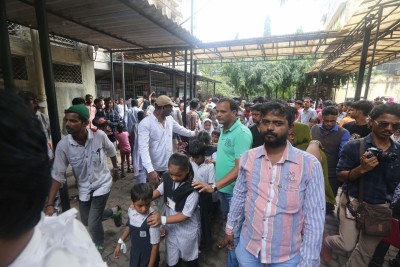 Mumbai, Feb 3 : Hoping to improve the public perception towards the schools run by the BrihanMumbai Municipal Corporation (BMC), the country’s richest civic body has decided to redesignate all its schools as ‘Mumbai Public Schools’, while giving a mega-push to infrastructure development of the country’s commercial capital, BMC Commissioner I.S. Chahal said here on Wednesday.
Mumbai, Feb 3 : Hoping to improve the public perception towards the schools run by the BrihanMumbai Municipal Corporation (BMC), the country’s richest civic body has decided to redesignate all its schools as ‘Mumbai Public Schools’, while giving a mega-push to infrastructure development of the country’s commercial capital, BMC Commissioner I.S. Chahal said here on Wednesday.
Presenting the BMC’s Rs 39,038.83 crore budget — an increase of 16.74 per cent over last year’s Rs 33,441.02 crore — Chahal said the revenue estimates for the current fiscal was Rs 28,448.30 crore, which has been reduced by Rs 5,876.17 crore and revised to Rs 22,572.13 crore, largely owing to the fall in income because of the coronavirus pandemic and the lockdowns.
Similarly, he said that the budget estimates for the next financial year (2021-22) for revenue income is proposed to be Rs 27,811.57 crore which is Rs 636.73 crore less than the budget estimates of the previous year.
The BMC’s incomes have declined on several counts, including property tax, development plan department, Octroi collections, pending dues from the state government, interest on its investments owing to consistent drop in the repo rates, besides owing to various relaxations granted due to the Covid-19 pandemic.
On the schools front, he said the civic body will also upgrade its 963 upper primary and 224 secondary schools to bring them on par with the ICSE/CBSE boards.
The BMC will also start 10 new CBSE schools this year besides developing 20 out of 63 playgrounds in phases to improve school infrastructure, Chahal said.
Earlier, Joint Municipal Commissioner Ramesh Pawar presented a Rs 2,945.78 crore education budget – higher by a meager Rs 1.19 crore compared to the previous year – with provisions for virtual classrooms, digital classrooms, science buildings, etc.
Giving a big fillip to infrastructure, Chahal said the BMC plans to spend Rs 18,750 crore for major projects like the Coastal Road Project, Goregaon-Mulund Link Road, a hydro-solar power project at the Balasaheb Thackeray Middle Vaitarna Dam, and a desalination plant.
The BMC will also rejuvenate Mumbai’s only flowing freshwater body, the Mithi River and its branches, upgrade the country’s biggest slaughterhouse Deonar Abattoir, construct 12 railway bridges, 6 new bridges and upgrade 5 hospitals.
The BMC has proposed to the Maharashtra government to declare it as ‘a single planning authority’ for entire Mumbai for integrated planning and development of the city in the immediate future, and this is being actively considered by the government.
The BMC will develop 149 footpaths of 160 km length, 128 traffic islands, 42 out of 344 spaces under flyover and bridges, around 19 km total, build 108 community toilets, 20,301 public toilets, upgrade 5 gardens in each ward, aesthetic painting of walls and food hubs at 65 locations having approximate a capacity of 3,331 vendors covering a total length of 11 km operational from 6 p.m. to 11 p.m.
Since Mumbai city has recently joined the C40 cities in the world to address climate change issues, the BMC will create a ‘Climate Change Department’ to address climate change and pollution issues in the city.
Mumbai’s famed tribe of over 5,000 Dabbawalas who are serving the city since 1870 will get a Dabbewala Bhavan in Central Mumbai.
With growing tourism to the city known for its cosmopolitan nature and heritage, the BMC plans to decongest the Mumbai skyline with a new hoarding policy to regulate or reduce hoardings which deface the city.
–IANS
qn/arm

